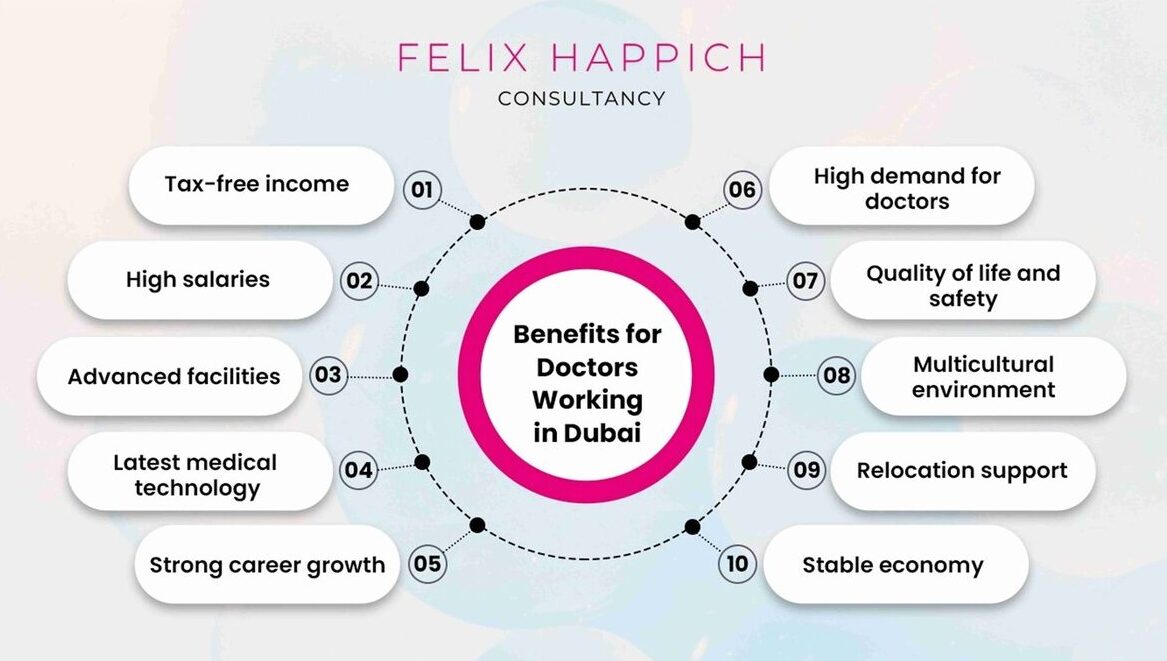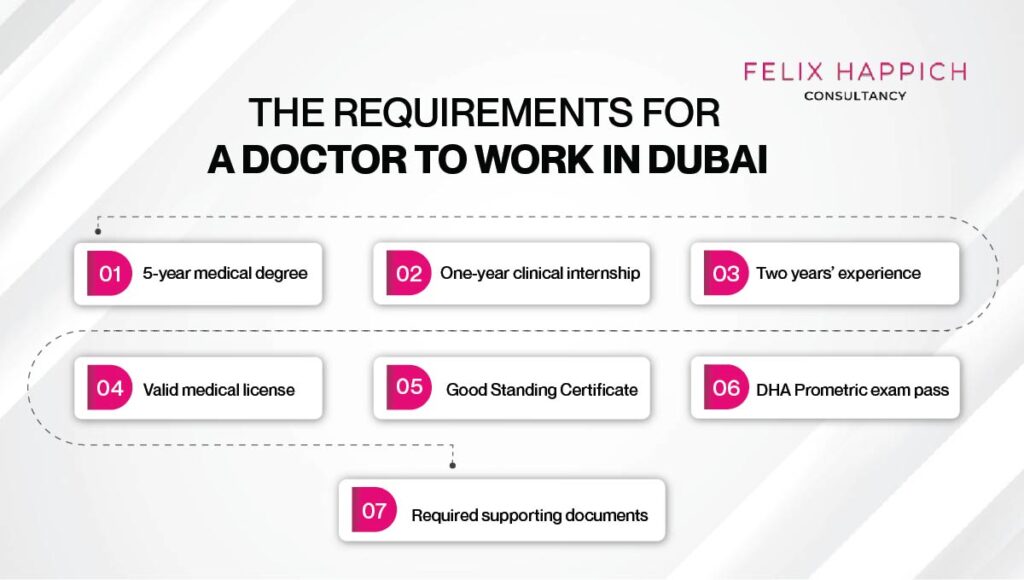Working as a doctor in Dubai is very beneficial in terms of salaries and advanced medical technology; however, it requires compliance with strict DHA licensing procedures and adaptation to a structured healthcare system. The benefits of working as a doctor in Dubai include tax-free income, high salaries, advanced healthcare technology, and a multicultural society.
Dubai’s healthcare sector is expanding through government initiatives like the Dubai Health Strategy 2021–2030, which increases demand for medical specialties such as Oncology, Cardiology, Family Medicine, and Geriatrics. Medical doctors working in Dubai have the opportunity to use advanced technologies like robotic surgery and an AI-based patient record system for operations and diagnostic purposes.
Physicians in Dubai must meet certain requirements, such as a recognized medical degree, internship, two years of clinical experience, a valid license, and success in the DHA’s Prometric and oral assessments to practice medicine legally. The application process for doctors to get licensed and practice includes self-assessment, document verification, exams, and final license activation via a hiring facility.
Medical professionals in Dubai typically find employment by searching for jobs on platforms like LinkedIn and Indeed, preparing their professional CVs, and attending interviews. However, many applicants make common mistakes, such as submitting incorrect documents or applying without license eligibility.
Dubai offers physicians well-developed infrastructure, top-tier schools, expat-friendly communities, and a culturally diverse environment. Still, they often face challenges in adapting to the UAE’s structured medical system and in demonstrating cultural sensitivity while treating patients from different cultural and religious backgrounds.
What are the Benefits for Doctors Working in Dubai?
The benefits for doctors working in Dubai include tax-free income, high salaries, advanced facilities and technology, a high quality of life and safety, a multicultural environment, relocation support, and opportunities for professional development.
Medical doctors are in high demand and enjoy fast career growth in Dubai, supported by initiatives such as the Dubai Health Strategy 2021–2030, which focuses specifically on healthcare professionals. This strategy aims to transform the healthcare system from a reactive model to one that is proactive and centered on prevention, creating new opportunities for doctors in the region.

Here are the benefits for doctors working in Dubai:
Tax-Free Income
Doctors enjoy tax-free income in Dubai as there is no personal income tax under Federal Decree-Law No. 47/2022. This tax-free income, along with several other benefits, attracts doctors from all over the world.
High Salaries
Doctors in Dubai earn high salaries and enjoy several other benefits. For instance, general physicians with 0 to 2 years of experience have a monthly salary starting from AED 9,500 to AED 20,000, while surgeons or consultants earn between AED 70,000 and AED 100,000. The monthly or annual income is not clearly stated by the Dubai government; however, DHA increased the salaries of doctors by 20% in 2007.
Advanced Facilities & Technology
Doctors in Dubai work in advanced healthcare facilities equipped with technologies such as robotic-assisted surgery, smart diagnostics, and remote monitoring. The healthcare system of Dubai has introduced world-class technologies. The Dubai Healthcare City Authority has integrated AI systems into its administration, resulting in the unification of 9.5 million patient records through NABIDH.
The American Hospital Dubai uses the 4th-generation da Vinci Xi system to complete more than 100 different types of surgeries, like gallbladder removal, hysterectomy, and prostatectomy.
High Demand & Career Growth
Doctors in Dubai are in high demand and have great career growth opportunities due to rapid career advancement, aging demographics, the medical tourism strategy, the Dubai Health Strategy 2030, and the expansion of public and private healthcare systems. The population of Dubai is expected to grow from approximately 3.6 million in 2024 to 6 million by 2040, as per the Dubai 2040 Urban Master Plan.
This population growth will multiply the demand for General Practitioners (GPs), Family Physicians, Endocrinologists, Cardiologists, Oncologists, as well as Geriatric and Home Care Doctors in Dubai.
High Quality of Life & Safety
Doctors in Dubai enjoy a high quality of life and safety. Dubai is ranked #1 in the Middle East and North Africa (MENA) for quality of life according to the InterNations Expat Insider 2023 Report. Dubai has very low crime rates and ranks among the top 10 safest cities in the world, according to Numbeo’s 2024 Crime Index.
Multicultural Environment
Dubai has expatriates from over 200 nationalities from Asia, Europe, the Middle East, Africa, and America. This helps doctors deal with a wide range of medical conditions and genetic profiles, and multiple medical education systems and protocols. This multicultural environment sharpens clinical skills, diagnostic abilities, and cross-cultural communication.
Relocation Support
The Dubai healthcare system and government have made policies to provide relocation support to doctors. Public and private healthcare systems assist doctors in obtaining a UAE employment visa, completing Emirates ID processing, undergoing medical fitness testing, and securing their labour card registration through their employer.
Stable Economy
Doctors in Dubai benefit from predictable income and job security due to the country’s stable economy. The UAE’s GDP is predicted to grow at 3.5% annually through 2025, with a major contribution from non-oil sectors like healthcare, tourism, and technology, according to reports from the UAE Ministry of Economy and the World Bank. This stable economic growth supports long-term job stability for doctors in Dubai.
What are the Requirements for Working as a Doctor in Dubai?
The requirements for working as a doctor in Dubai include a medical degree, a one-year internship, two years of clinical experience, a valid medical license, a Good Standing Certificate, the DHA Prometric exam, and an oral assessment, as outlined on the official website of the Dubai Health Authority.

The requirements for a doctor to work in Dubai are outlined below:
- A 5-year medical degree, such as an MD or MBBS, from a reputable medical institution.
- One-year internship in clinical practice after graduation.
- A minimum of two years of clinical experience after the internship.
- A valid medical license from the respective country.
- A Good Standing Certificate issued by the medical authority of the home country.
- A passing certificate for the DHA Prometric exam and oral assessment.
- Required documents include a valid passport, a recent photo, a visa or visa copy, attested degrees, experience letters, malpractice insurance, and a medical fitness certificate.
What is the Application Process for Doctors to Work in Dubai?
The application process for doctors to work in Dubai includes a self-assessment tool, Primary Source Verification (PSV), a Prometric computer-based test (CBT), application submission, oral assessment, and final license activation through a hiring facility.
The step-by-step application process for doctors is outlined below:
- Complete the self-assessment tool available on the official Dubai Health Authority (DHA) website.
- Begin the Primary Source Verification (PSV) of all required documents—such as degrees, passport, and Good Standing Certificate—through DataFlow.
- Pass the Prometric Computer-Based Test (CBT), unless you are from an exempted country such as Australia or the United States.
- Fill out the DHA medical license application form on the Sheryan portal and pay the required fees.
- Obtain the DHA medical license and activate it through the hiring medical facility.
How Can a Doctor Apply for a DHA Medical License?
A medical doctor can apply for a DHA medical license specific to doctors by registering on the Sheryan Portal of the Dubai Health Authority, completing the self-assessment, submitting documents for Primary Source Verification (PSV) via DataFlow, passing the Prometric exam, submitting the license application, attending an oral assessment, and activating the license through a hiring medical facility.
How to Apply for a Job as a Doctor in Dubai?
You can apply for a job as a physician in Dubai by searching for jobs, checking eligibility, preparing your documents, applying online, and attending interviews. Many medical professionals find job searching in Dubai challenging due to limited experience and high competition. That’s why it is advisable to consult with an experienced healthcare recruitment agency.
Healthcare professionals should also include all relevant details about their specialist training, professional licenses, and memberships or affiliations with medical programs to improve their chances of job acceptance.
Here are the steps to apply for a job as a physician in Dubai:
- Search for physician jobs on job portals such as Naukrigulf, Indeed, and LinkedIn. Use filters based on your degree, experience level, and preferred region. Attend job fairs and conferences if you are already in Dubai.
- Check the eligibility criteria of both the Dubai Health Authority and the medical facility where you are applying. Ensure you meet all the requirements, such as holding a 5-year medical degree, completing Primary Source Verification, and passing the Prometric exam.
- Prepare all necessary documents, including your DHA license, medical degrees, experience letters, and Good Standing Certificate.
- Create a professional CV and submit your job application, highlighting skills and experience that match the job description.
Which Medical Specialties Are in Highest Demand in Dubai?
The medical specialties that are in highest demand in Dubai are Orthopedics, Obstetrics & Gynecology, Family Medicine, Pediatrics, and Endocrinology. This demand is driven by an increase in lifestyle-related illnesses.
The most sought-after medical specialties in Dubai include:
- Oncologists
- Cardiologists
- Orthopaedic Specialists
- Neurologists
- Dermatologists
- Geriatric Medicine Specialists
- Pediatricians
How Can a Medical Professional Search for a Job?
A medical professional can search for a job through job portals such as LinkedIn, Indeed, Naukrigulf, and Bayt. Healthcare professionals should also consider attending medical conferences and job fairs in Dubai to explore additional opportunities.
What are the Salaries of Doctors Working in Dubai?
The salaries of medical doctors working in Dubai range from AED 15,000 to AED 110,000 per month. The Dubai Health Authority does not officially publish salary scales; however, figures can be estimated based on job listings from platforms like LinkedIn, Indeed, and Naukrigulf.
Here is an overview of estimated monthly salaries (in AED):
| Role | Monthly Salary (AED) |
|---|---|
| General Physician / MBBS | 15,000 – 40,000 |
| Specialist | 30,000 – 90,000 |
| Consultant / Surgeon | 70,000 – 110,000 |
| Government Doctor | 35,000 – 75,000 |
| Private Consultant | 90,000 – 110,000 |
What are the Working Hours for Medical Doctors in Dubai?
Doctors in Dubai typically work 8 hours per day and 48 hours per week in the private healthcare sector. In the public sector, the schedule usually consists of four full working days and a half day on Friday, with hours from 7:30 am to 3:30 pm. Public sector doctors also work on rotating shifts that may include night duties and weekend coverage.
What Should a Doctor Avoid When Applying for a Job in Dubai?
Physicians should avoid misreporting experience, submitting documents in the wrong format, ignoring eligibility criteria, and applying without holding a valid DHA medical license. These mistakes can result in application rejection, permanent disqualification from DHA licensing, or even legal consequences related to document fraud. Working with a qualified healthcare recruitment consultancy is strongly recommended.
Here are common mistakes doctors should avoid:
Misreporting Experience or Submitting Incorrect Document Formats
Falsifying experience or submitting documents in the wrong format will be detected during Primary Source Verification via DataFlow. Doctors must ensure that all experience details and document formats meet DHA standards to avoid serious consequences.
Ignoring Eligibility Criteria for Specialties
Overlooking the eligibility criteria for specific specialties can lead to delays or disqualification from reapplying for the same position. Doctors should carefully review all specialty-specific requirements before proceeding with an application.
Applying Without a License in Hand
Applying without a DHA medical license is not advisable. Healthcare facilities will mostly not consider applications without proof of licensing, even if the candidate meets all other qualifications.
How is Life in Dubai for Medical Professionals?
Medical professionals in Dubai enjoy modern urban comforts, an excellent education system, a family-friendly social environment, multicultural integration, and a safe social life. The Dubai government has invested in several projects to improve the lifestyle of residents. For example, the DHA approved a 9% increase in licensed healthcare facilities in Q1 of 2024, according to the Emirates News Agency (WAM).
Housing, Transport, and Cost of Living
Housing rent in Dubai ranges from AED 4,500 to AED 15,000 per month, depending on the number of bedrooms and the neighborhood. Public transport expenses range from AED 200 to 700 per month. Utility bills range from AED 500 to 1,200, internet bills can reach up to AED 300, grocery expenses range from AED 800 to 1,500, and healthcare insurance typically costs between AED 500 and 2,000 per year.
Schools and Family Life for Expats
International students in Dubai from India, the United Kingdom, the United States, and other countries pay school fees ranging from AED 20,000 to AED 100,000 per year. Dubai offers a family-friendly environment for expats, including parks, beaches, and modern healthcare facilities.
Social Integration and Lifestyle Choices
Dubai is home to expats from over 200 nationalities, creating a culturally rich and inclusive environment. This diversity helps medical professionals build strong professional networks and learn about a wide range of lifestyles.
Areas Where Doctors Prefer to Live
Popular residential areas among doctors include Jumeirah Village, Al Barsha, Dubai Marina, and Downtown Dubai. These areas are preferred due to their well-developed road and metro networks that provide easy access to hospitals, schools, luxury malls, and public parks.
What are the Challenges Physicians Face in Dubai?
Doctors in Dubai face several challenges, including delays in licensing, errors in the application process, adjusting to the UAE’s workplace culture, managing the high cost of living, and demonstrating cultural sensitivity in patient interactions.
Licensing Delays and Application Errors
The DHA licensing process involves multiple steps: application submission, documentation, Primary Source Verification, and payment of licensing fees. Each step can take between 1 and 8 weeks. Inexperienced applicants often make errors, particularly with Primary Qualification Requirements, such as incorrect document formats or missing timelines in experience letters. Common mistakes include incomplete documents, mismatched work history, and missing or invalid Good Standing Certificates.
Adapting to the UAE’s Work Culture
International medical professionals may find it challenging to adapt to the UAE’s work culture, which includes strict expectations regarding hierarchy, documentation, punctuality, and patient satisfaction.
Managing the High Cost of Living
Despite tax-free income, Dubai remains one of the most expensive cities in the Middle East. Doctors must carefully manage expenses related to housing, transportation, education, and private healthcare.
Cultural Sensitivity in Patient Interactions
Dubai’s diverse patient population includes Emiratis, Arabs, South Asians, Westerners, and Southeast Asians. Doctors often face language barriers, varying cultural expectations, and religious sensitivities. Providing appropriate care requires awareness and respect for patients’ cultural and religious backgrounds.
Licensing Consultation Cost
Many physicians choose to hire licensing consultancies to get help in the complex stages of the application process. However, choosing a professional DHA license agency is costlier and difficult to help doctors focus on patient care rather than administrative hurdles. The cost ranges from AED 3,000 to AED 10,000, depending on the services provided.





